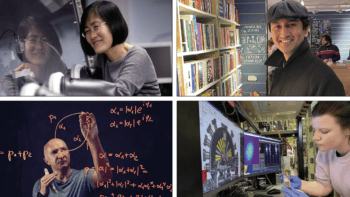If you want a job in hi-tech industry, it pays to tailor your CV so that it makes the most of your business-relevant skills and expertise, says Andrew Hirst
Physics World: What do people in industry tell you they need to see on a CV?
Andrew Hirst: Writing a good CV for any job requires you to present strong evidence that you can do the job or – if you haven’t finished your degree yet – that you have the potential to do so. One mistake students often make is to believe their CV will land them the job they’ve applied for. A CV is the beginning and not the end of the recruitment process. It’s a door opener to the next step, be it a telephone interview, an assessment or a face-to-face interview. Your CV is a marketing tool that highlights to the recruiter your relevance to the job requirements, which will depend on the role, sector and seniority of the position.
So presumably it’s vital to tailor your CV to the role?
Yes, you need to emphasize the most relevant skills and experiences for the job. One common mistake that students make is to submit a generic CV to multiple employers. When your CV arrives at its destination, its content will either appeal or it won’t. Your job is to take the excellent work you’ve done and feature it in a way that opens the doors you want opened. Remember that companies have different needs depending on the sector they’re in – be it aerospace, food manufacturing, automotive or optics – and the type of role you are applying for.
If your degree’s purely academic, how can you show you’re suited to a job in industry?
Employers do want to see a track record of academic attainment but crucially they also want to see you can apply your physics knowledge beyond the lecture theatre, to solve real technical problems. They want evidence that you have a range of aptitudes that you’ll need in a business setting.
And what exactly are those aptitudes?
Having spoken to many employers about the skills they associate with excellent undergraduates and graduate students, they are after people who are commercially aware, who can provide solutions to business needs, and who enjoy applying knowledge to real and incomplete problems. They want people who can deliver results in different team environments and cultures, who understand themselves, and who are team players who can adapt to new situations.
So your CV shouldn’t just flag academic attainment?
Yes, employers are interested in a range of skills and behaviours beyond just the ability to solve equations or learn from a textbook. When writing your CV, think about examples from your time at university that show you’ve applied these competencies, whether it’s in the lab or in an extra-curricular activity – such as when you volunteered or worked in an office.
What practical advice do you have for writing a CV?
Only include information from your career that’s relevant to the job application. Concentrate on specific examples and write a maximum of two A4 pages – there’s no need to write a novel. Highlight what you’ve achieved – not just what you’ve done. Don’t just list the modules you’ve studied, people you’ve worked for or extra-curricular activities you’ve taken part in. They’re important, but also state what you did, how you did it and what were the results.
What’s the best way of marshalling all relevant information on a CV?
To make clear to employers how your academic knowledge, technical skills and extra-curricular activities are relevant to the job in hand, it’s useful to write a “competency-based” CV. This includes similar information to the more traditional “reverse-chronological” CV, where you list everything you’ve done starting from now and working backwards. A competency-based CV instead organizes the content into a sequence of competencies and skills that match the requirements in the job specification. This kind of CV lets employers see more easily how your experience and skills match the requirements of the job.
That sounds great, but how do you do that in practice?
A simple tactic is to use the “challenge-approach-results” (or CAR) method. First, think about a problem or obstacle you have faced (the challenge). Then consider the action you took to resolve the problem (the approach). Finally, note down what was the outcome (the result).
Can you can give some examples of this from someone who’s done a physics degree?
To show evidence for teamwork, you could say something like: “I worked in a group of five students to conduct a four-week project to investigate the linear expansion of metals through interferometry. My role was to assign and prioritize tasks to team members and to contribute to the data analysis and verbal presentation. This assignment gave me experience of project management, communicating results within a team and completing tasks to meet a set deadline.” Or, to give evidence of lab skills, you could say: “I have designed, implemented and run weekly experiments, with little supervisory guidance, in atomic physics, solid state and optics. For example, I conducted an experiment that investigated the moment of inertia of different bodies, making use of rotary motion and force sensors. I would calculate theoretical parameters and compare to experimental values found from manipulating data. This required me to problem-solve throughout the experiment in terms of fault-finding and error analysis.”
Any practical tips about the style and appearance of the CV?
Don’t go mad. Don’t use fancy borders, fonts or background colours – no-one wants to read a CV in pink, 18-point Comic Sans. Just use clear, well-spaced text that can be read quickly and easily. It’s also vital to avoid clichés – I’ve lost count of the number of times I’ve read on a CV something like “I am an enthusiastic individual with excellent communication skills.” Clichés will not allow you to stand out from the crowd – instead give concrete examples of when you’ve learnt or enhanced these particular skills.
So what kind of things should you say?
If you want to flag your communications skills, you might write: “As part of my professional-skills module I have given several presentations, including one on the application of photomultiplier tubes. This gave me the experience to communicate ideas and results to both students and staff. I also wrote a formal report that investigated the temperature variation of electrical resistance within metals and semiconductors. I discussed the theory I applied to the experiments; mentioned the method I used to gather suitable data, for example, by calibrating a thermocouple and using data-acquisition interfaces; and analysed my results in terms of errors and the importance and implications of my results.”
Any final advice to help bag that top industry job?
Research the job and company you’re interested in before you start writing. Understand how your interests, academic knowledge and extra-curricular activities fit the role and the organization you hope to work for. Mirror the structure of the CV to the job’s specification or competencies and include relevant modules from your degree. Articulate relevant skills and experience – and give examples. And finally, proofread the document. There’s no excuse for spelling mistakes.




